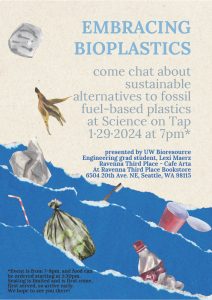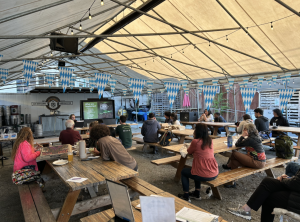Embracing Bioplastics: A Sustainable Alternative to Fossil Fuel-Based Plastics
Lexi Maerz
20 May 2024
On January 29th, 2024, Science on Tap held their monthly science talk at Ravenna Third Place Bookstore, where I was honored to be featured as their guest speaker. I am a Master’s student in Bioresource Science and Engineering at the University of Washington researching sustainable alternatives to fossil-fuel based plastics. I shared my insights into the promising future of bioplastics, showcasing my own work in the lab.

The event attracted an audience of about 40 people, all looking to learn about research on sustainable materials. The evening began with an in-depth presentation about bioplastics and their relationship to climate change. I explored some of the science behind bioplastics, their environmental benefits, and the challenges they face in competing with traditional plastics.

My talk was informative while highlighting the critical role that bioplastics could play in reducing our reliance on fossil fuels. In conclusion, I highlighted a selection of book recommendations from Third Place Bookstore that offered an optimistic outlook on the future of the climate.
As I explained in the talk, 99% of plastics are made from fossil fuel based chemicals, and only 9% are ever recycled into usable materials. Fossil fuels account for 75% of global greenhouse gas emissions, and according to the OECD, plastics contributed approximately 3.3% of global emissions in 2019. I shared my thoughts on how my research connects to climate change issues more broadly, underscoring the urgent need for a circular economy to reduce dependence on fossil fuels.
I explained that recognizing traditional plastics are not the largest contributor to global emissions, they’re still a very important component. We have to keep fossil fuels in the ground, so we have to have access to economically viable renewable alternatives to everything we currently use fossil fuels for, including plastics. I proposed an integrated biorefinery system as a replacement for the traditional plastic production process, where biomass could be made into bio-based products like bioplastics. My research highlights the potential of plastics that are both compostable and biodegradable, underscoring the role bioplastics could play in creating a more sustainable future.
Following the presentation, the event transitioned into an engaging question-and-answer session, where attendees had the opportunity to have their questions answered directly. The discussion was dynamic, with participants from various backgrounds contributing their perspectives, leading to a broader conversation about the future of sustainable materials and the potential impact of bioplastics on global environmental challenges. I addressed questions about the cost-effectiveness and scaling process of the production of bioplastics. I explained that whilst initial investments may be high, the long-term benefits such as streaming plant waste to make bioplastics and the reduced use of fossil fuels make the endeavor worthwhile. The event concluded with a sense of optimism and a deeper understanding of the work being done to create a more sustainable future.

On May 9th, 2024, I revisited the topic of bioplastics at Brickerson’s Brewhouse, adding a trivia component that made the presentation both informative and engaging. Building on the previous Science on Tap talk, I focused on how bioplastics can become a viable alternative to fossil fuel based plastics. To keep the audience actively involved, trivia questions related to the discussion topics were interspersed throughout the talk, requiring attendees to pay close attention to the information presented in order to answer correctly. Each round of trivia ended with a general knowledge question, keeping the audience on their toes. The final round, worth double points, was on climate change in pop culture, offering a fun twist and giving those with less specialized knowledge a chance at redemption. This approach to a trivia-based presentation reinforced the key points of my research but also made the event an enjoyable and interactive learning experience for all.
Some trivia question highlights included:
- What is the main source of methane emissions related to human activities? (Answer: Livestock)
- What is the term for the process by which carbon dioxide is removed from the atmosphere and stored in long-term reservoirs such as oceans, forests, and soil? (Answer: Sequestration)
- What is the term for the positive feedback loop where melting sea ice exposes more dark ocean, which absorbs more heat and causes more ice to melt? (Answer: Albedo or ice-albedo)
- What is the most common type of plastic used in single-use bottles and food packaging today? (Answer: PET Polyethylene Terephthalate)
- Is beer compostable? (Answer: Yes!)
The trivia element sparked lively conversations between the audience and myself. As I fielded questions about the process of making bioplastics—such as what materials can be used to create them—the conversation turned to a broader discussion about the endless possibilities of bioplastics and the crucial role they play in revolutionizing the way we produce plastics today. The interactive approach not only reinforced her my research findings but also prompted the audience to think more deeply about the future of sustainable materials.

Through my two talks, I shared both knowledge and an engaging experience with the audience. The event left attendees excited about the potential of bioplastics and eager to explore more about a sustainable future.
Additional Information
To learn more about Lexi Maerz’s research, feel free to reach out at maerza@uw.edu.